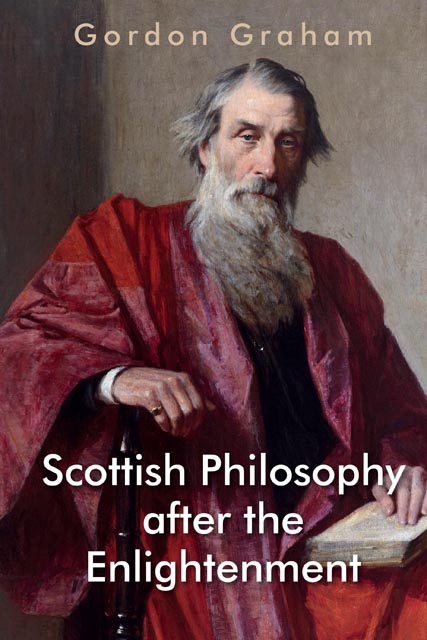Book contents
- Frontmatter
- Contents
- Preface and Acknowledgements
- Series Editor’s Introduction
- A Note on Women in Scottish Philosophy: Mrs Oliphant
- A Chronology of Scottish Philosophy after the Enlightenment
- 1 An Autobiographical Prologue
- 2 Sir William Hamilton and the Revitalisation of Scottish Philosophy
- 3 James Frederick Ferrier and the Course of Scottish Philosophy
- 4 Psychology and Moral Philosophy: Alexander Bain
- 5 Thomas Carlyle and the Philosophy of Rhetoric
- 6 Hegelianism and its Critics
- 7 Scottish Philosophy’s Progress
- 8 Religion, Evolution and Scottish Philosophy
- 9 The Gifford Lectures and the Re-affirmation of Theism: Alexander Campbell Fraser
- 10 The Culmination of Scottish Philosophy: A. S. Pringle-Pattison
- 11 John Macmurray and the Self as Agent
- Bibliography
- Index
10 - The Culmination of Scottish Philosophy: A. S. Pringle-Pattison
Published online by Cambridge University Press: 07 June 2023
- Frontmatter
- Contents
- Preface and Acknowledgements
- Series Editor’s Introduction
- A Note on Women in Scottish Philosophy: Mrs Oliphant
- A Chronology of Scottish Philosophy after the Enlightenment
- 1 An Autobiographical Prologue
- 2 Sir William Hamilton and the Revitalisation of Scottish Philosophy
- 3 James Frederick Ferrier and the Course of Scottish Philosophy
- 4 Psychology and Moral Philosophy: Alexander Bain
- 5 Thomas Carlyle and the Philosophy of Rhetoric
- 6 Hegelianism and its Critics
- 7 Scottish Philosophy’s Progress
- 8 Religion, Evolution and Scottish Philosophy
- 9 The Gifford Lectures and the Re-affirmation of Theism: Alexander Campbell Fraser
- 10 The Culmination of Scottish Philosophy: A. S. Pringle-Pattison
- 11 John Macmurray and the Self as Agent
- Bibliography
- Index
Summary
I
Andrew Seth (latterly Seth Pringle-Pattison) occupied the Chair of Logic and Metaphysics at the University of Edinburgh from 1891 to 1919. The Chair itself had a distinguished history. Seth succeeded his teacher Alexander Campbell Fraser, who had himself succeeded his teacher Sir William Hamilton. Together the tenure of these three philosophers in the Edinburgh Logic Chair extended over more than eighty years, and all of them were held in high esteem by their philosophical contemporaries and their students. None of them, however, has attracted much attention in the history of modern philosophy. Even their contribution to the history of philosophy in Scotland is largely overshadowed by the towering figures of the previous century. Alexander Broadie’s History of Scottish Philosophy (2009) is uniquely comprehensive, yet while his discussion of Hume, Smith and Reid extends to 175 pages, his discussion of Hamilton and Pringle-Pattison is confined to twelve. Fraser (who figured so prominently in the previous chapter) is merely mentioned.
Though Broadie’s treatment is modest, wider-ranging histories of philosophy, as could be expected, invariably give these figures even less attention, often none at all. When Hamilton does figure, it is largely as a historical curiosity, notable chiefly as the subject of J. S. Mill’s devastating Examination, and a figure whose own work no longer has any interest for contemporary philosophy. The case of Pringle-Pattison is a little different because in several places he has been accorded special status as a forerunner in the development of ‘personalism’. The Stanford Encyclopedia of Philosophy tells us that in the first half of the twentieth century ‘personalism’ came to designate a variety of philosophical schools that grew out of a reaction to the de-personalising elements in Enlightenment rationalism, Hegelian Idealism, and materialist psychology. Personalist philosophical systems are so called because they focus on ‘the person’ as the most fundamental explanatory principle of reality, and the leading representative of British idealistic personalism, the entry goes on to note, was Andrew Seth Pringle-Pattison. This claim is elaborated at slightly greater length in the Oxford Handbook of British Philosophy in the Nineteenth Century, where, under the heading of ‘Personal Idealism’, Pringle-Pattison is allocated a section in the chapter on ‘British Idealist Philosophy of Religion’. Broadie is more emphatic.
- Type
- Chapter
- Information
- Scottish Philosophy after the Enlightenment , pp. 188 - 205Publisher: Edinburgh University PressPrint publication year: 2022

